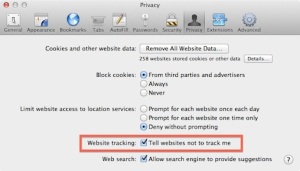 Once upon a time there was a world of perfect web information when you knew where you visitors came from, what they were looking for, what they found, how long they stayed, and where/why they left. I don’t know about you, but more than 30% of my web visits these days come from “encrypted search terms.” From WordPress Jetpack to Google Analytics I see “(not provided)”, “encrypted search term”, “unknown search term”, or “other search term” every day in my keyword referrals.
Once upon a time there was a world of perfect web information when you knew where you visitors came from, what they were looking for, what they found, how long they stayed, and where/why they left. I don’t know about you, but more than 30% of my web visits these days come from “encrypted search terms.” From WordPress Jetpack to Google Analytics I see “(not provided)”, “encrypted search term”, “unknown search term”, or “other search term” every day in my keyword referrals.
 Where is this going as more an more people opt to select “do not track”? Will our information as content creators, web designers and curators be incorrect? If I do not know which of my content is most effective, how will I deliver what is most valuable? What happens when and if privacy concerns get to the point of website users not wanting website owners to even know when and if they access content?
Where is this going as more an more people opt to select “do not track”? Will our information as content creators, web designers and curators be incorrect? If I do not know which of my content is most effective, how will I deliver what is most valuable? What happens when and if privacy concerns get to the point of website users not wanting website owners to even know when and if they access content?
Completely anonymous browsing would lead to imperfect websites, where in order to find out what works and what doesn’t, you would have to go back to focus groups and test sample markets; supremely slow adaptation is what this reads. No longer could the web be dynamic, custom tailored, or quick to change in meeting our every whimsical desire. No longer would the try and fail quickly, iteration, least viable business model approach work. Will that happen, likely not.
 Sure many people will stick to their privatest ways, hiding in the dark shadows of the web, creeping on websites and hiding browsing data with the fear the Uncle Sam is watching my every move. The derived right to privacy seems fundamental to our US culture, but technology and the web has dipped dramatically in the favor of public good and connectivity. Have you ever asked how Google gets its live traffic information on Google Maps? I looked the other day to find that when Andriod users are opted into location tracking (to show where they are on the map, identify close restaurants, directions, etc) they are also agreeing to share their location constantly with Google. When Google see’s a bunch of Android cell phones slowing down at the same time, it knows there is likely traffic their. Crazy hunh?
Sure many people will stick to their privatest ways, hiding in the dark shadows of the web, creeping on websites and hiding browsing data with the fear the Uncle Sam is watching my every move. The derived right to privacy seems fundamental to our US culture, but technology and the web has dipped dramatically in the favor of public good and connectivity. Have you ever asked how Google gets its live traffic information on Google Maps? I looked the other day to find that when Andriod users are opted into location tracking (to show where they are on the map, identify close restaurants, directions, etc) they are also agreeing to share their location constantly with Google. When Google see’s a bunch of Android cell phones slowing down at the same time, it knows there is likely traffic their. Crazy hunh?
In my opinion this is all great stuff that truly does you little if no harm, but I am sure that if everyone knew that, it could turn into a big privacy uproar eventually leading to Google needing a more costly, non crowd-sourced way, of identify traffic delays. To me what all of these privacy questions will lead to is a need for more good-ol-fashion statistics. No longer will you know the entire base of your population, but you will have to derive a population mean from your sample with a determined confidence requirement.
Perhaps someone will read this as a substantial business opportunity for the future (which will likely be captured, created at, purchased by, or merged into Google, Apple et. al. eventually) is web statistics simply integrated in graphic form with web analytics. I think most people’s eyes glaze over at the first mention of statistics, standard deviations, and confidence intervals, but to me that is the opportunity shinning its head. Will some people ride the privacy crazy train, yes; lets just hope not too many. All that can be told is that future will definitely unfold new needs for solutions (new opportunities) in a world of encrypted search terms.